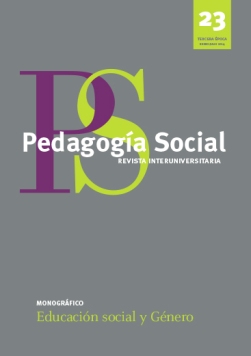Medios de comunicación: ¿espacio para el ocio o agentes de socialización en la adolescencia?
DOI:
https://doi.org/10.7179/PSRI_2014.23.10Palabras clave:
Socialización, adolescentes, educación secundaria, familia, medios de comunicaciónResumen
En la última década los medios de comunicación y los medios tecnológicos se han convertido en fuente de estrategias simbólicas para los sectores más jóvenes de la sociedad. El objetivo de este artículo es analizar el impacto que estas estrategias tienen en el alumnado de 11 a 14 años. A partir de una muestra de 846 estudiantes, pertenecientes a centros situados en contextos geográficos diferentes, se han investigado dos variables, con un índice de consistencia de Cronbach de 0,918: la primera analiza los factores de la implicación del alumnado, es decir, las variables psicoeducativas producidas en su proceso de compromiso personal y en su desarrollo psicosocial. La segunda determina la jerarquización de aquellos agentes que ejercen un papel socializador sobre este alumnado. Los resultados ponen de manifiesto que los medios de comunicación han desplazado a las familias y a los propios centros educativos como ejes de socialización principales.
Descargas
Citas
Bas, E. y Pérez de Guzman, M. V. (2010). Desafíos de la familia actual ante la escuela y las tecnologías de la información y comunicación. Educatio XXI, 28, 1, 41-67.
Blumenfeld, P., Fredricks, J. y Paris, A. (2004). School engagement: potential of the concept, state of the evidence. Review of Educational Research, cook, 74, 59-109.
Bolívar, A. (2006). Familia y escuela: dos mundos llamados a trabajar en común. Revista de educación, 339, 119-146.
Cabero, J.; Llorente, M. C. y Marín, V. (2010). Por una pedagogía de los medios: la prensa. XXI. Revista de educación, 12, 241-260
Dewey, J. (1998). Democracia y educación. Madrid: Morata
Domínguez Cuña, A. Y Rodríguez Machado, E. (2003), La percepción de las relaciones familiares por parte de los adolescentes. Revista galego-portuguesa de psicologia e educacón, 9, 375-386.
Durkheim, E. (1976). La educación como socialización. Salamanca: Sígueme.
Mustonen, A. (2000). Mediapsykologia. Helsinki: WSOY. Näkökulmia työväen huumoriin. Työväen historian ja perinteen tutkimuksen seura. 8-33. Nevanlinna. Helsinki: Kansan sivistystyön liitto.
Novoa, A. (2009). Educación XXI: para una historia del futuro. Revista Iberoamericana de educación, 49, 181-199.
Novo, M., Marpegán, C. y Mandón, M. J. (2002). El enfoque sistémico: su dimensión educativa. Madrid: UNED.
Olweus, D. (1998). Conductas de acoso y amenaza entre escolares. Madrid: Morata.
Palou, S. (2004). Sentir y crecer: El crecimiento emocional en la infancia. Barcelona: Graó.
Pallarès Piquer, M. (2013). Buscando el camino. Medios de comunicación y educación activa: retos del profesorado en el horizonte del 2020. Málaga: Universidad de Málaga.
Segovia, B.; Mérida, R.; González, E. y Olivares, M.A. (2013). Choque cultural en las aulas: profesores analógicos vs alumnado digital. El caso de Ana. EDUTEC, 43. Recuperado de: http://edutec.rediris.es/Revelec2/Revelec43/choque_cultural_aulas_profesores_analogicos_alumnado_digital.html
Sosa, J. A. (2009). Evolución de la relación familia-escuela. Tendencias Pedagógicas, 14, 251-265. Recuperado de: http://www.tendenciaspedagogicas.com/Articulos/2009_14_18.pdf
Vázquez, T. (2011). Educación informal. Configuración y valores de los protagonistas infantiles. EDUTEC, 35. Recuperado de: http://edutec.rediris.es/Revelec2/Revelec35/educacion_informal_configuracion_valores_protagosnistas_infantiles.html
Vila Merino, S. (2011). Racionalidad, diálogo y acción: Habermas y la pedagogía crítica. Revista Iberoamericana de Educación, 56, 3. Recuperado de: http://www.rieoei.org/deloslectores/3652Vila.pdf
Descargas
Publicado
Cómo citar
Número
Sección
Licencia
Derechos de autor 2014 Pedagogía social. Revista interuniversitaria

Esta obra está bajo una licencia Creative Commons Reconocimiento-NoComercial 3.0 Unported.
Derechos de reproducción y archivo
La versión publicada de los artículos podrá ser autoarchivada por sus autores en repositorios institucionales y temáticos de acceso abierto. No obstante la reutilización total o parcial de los mismos en nuevos trabajos o publicaciones deberá ser autorizada por Pedagogía Social. Revista Interuniversitaria.
Los trabajos publicados deberán ser citados incluyendo el título de la Revista, Pedagogía Social. Revista Interuniversitaria, nº, páginas y año de publicación.
Responsabilidades éticas
Pedagogía Social. Revista Interuniversitaria no acepta material publicado anteriormente en otros documentos. Los/as autores/as son responsables de obtener los permisos oportunos para reproducir parcialmente material de otras publicaciones y citar correctamente su procedencia. Estos permisos deben solicitarse tanto al autor/a como a la editorial que ha publicado dicho material.
Es obligación de Pedagogía Social. Revista Interuniversitaria detectar y denunciar prácticas fraudulentas.
En la lista de autores/as firmantes deben figurar únicamente aquellas personas que han contribuido intelectualmente al desarrollo del trabajo.
La revista espera que los/as autores/as declaren cualquier asociación comercial que pueda suponer un conflicto de intereses en conexión con el artículo remitido.
Los autores deben mencionar en el manuscrito, preferentemente en el apartado del método, que los procedimientos utilizados en los muestreos y controles han sido realizados tras la obtención de consentimiento informado.
La revista no utilizará ninguno de los trabajos recibidos con otro fin que no sea el de los objetivos descritos en estas normas.
Aviso de derechos de autor/a
© Pedagogía Social. Revista Interuniversitaria. Los originales publicados en las ediciones impresa y electrónica de esta Revista son propiedad del Pedagogía Social. Revista Interuniversitaria, siendo necesario citar la procedencia en cualquier reproducción parcial o total.
Salvo indicación contraria, todos los contenidos de la edición electrónica se distribuyen bajo una licencia de uso y distribución “Creative Commons Reconocimiento-No Comercial 3.0 España” (CC-by-nc). Puede consultar desde aquí la versión informativa y el texto legal de la licencia. Esta circunstancia ha de hacerse constar expresamente de esta forma cuando sea necesario.






